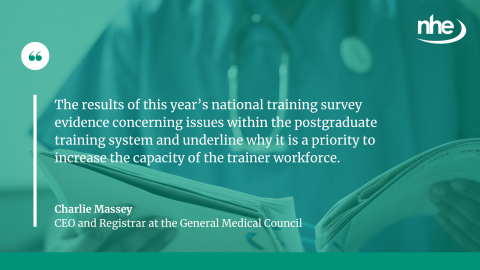Plans to boost the NHS workforce will fall flat unless trainers are prioritised, the General Medical Council (GMC) has warned after results from its national training survey show that many doctors are at risk of burnout.
The results show that, although most trainees are satisfied with their education, more than half (52%) of all trainers felt their work was emotionally exhausting — a theme that spans back to 2022. This is in addition to one in three (32%) respondents saying their work frustrates them.
Just under three in 10 (29%) trainers reported difficulties using the allocated time to train others alongside their regular clinical commitments. Around a third (31%) of trainers working in secondary care said there were issues with rota gaps not being dealt with effectively.
The specialties most at risk of burnout included:
- Emergency medicine (26%)
- Ophthalmology (16%)
- General practice (15%)
Charlie Massey, the GMC’s CEO and registrar, said: “The results of this year’s national training survey evidence concerning issues within the postgraduate training system and underline why it is a priority to increase the capacity of the trainer workforce.
“Employers and policymakers must use these data to further their understanding of the intensity of workloads and wellbeing issues within training environments, and develop action plans to ensure system sustainability.”

The GMC’s medical director and education standards director, Professor Colin Melville, added: “These data show there are clear signs of strain. This will only intensify as the number of medical students grows, and as those students go on to join the workforce.
“Employers and workforce planners must look ahead and make sure educators have the protected time and support they need to fulfil their important roles.”
Ultimately, the GMC says that training capacity must be increased if the NHS Long Term Workforce Plan — along with those in Scotland, Wales and Northern Ireland — is to succeed.
More than a fifth of trainees reported burnout in the survey, which was only compounded by fewer people reporting that they had access to the necessary opportunities to develop their leadership skills — just under seven in 10 (69%) agreed they had these opportunities in 2022, but that has fallen six percentage points since then.
Responding to the results, NHS Providers’ deputy CEO, Saffron Cordery, commented: “These findings are a reminder of the need for progress in ensuring a supportive and properly resourced environment for medical training, recognising the crucial role played by medical trainers and trainees in the care of patients today and in the future.
“Trust leaders are ready to play their part.”
The British Medical Association’s workforce lead, Dr Latifa Patel, echoed the GMC’s sentiment in that workforce expansion plans are not likely to succeed unless these trends are addressed now.
She said: “If not addressed now, plans to provide the future expanded workforce that we need risk foundering on the rocks of a burnt out, underdeveloped and overstretched trainee cohort.”
The survey accrued 74,000 responses — 52,000 being doctors in training and 22,000 being the doctors who train them.
Image credit: iStock



















